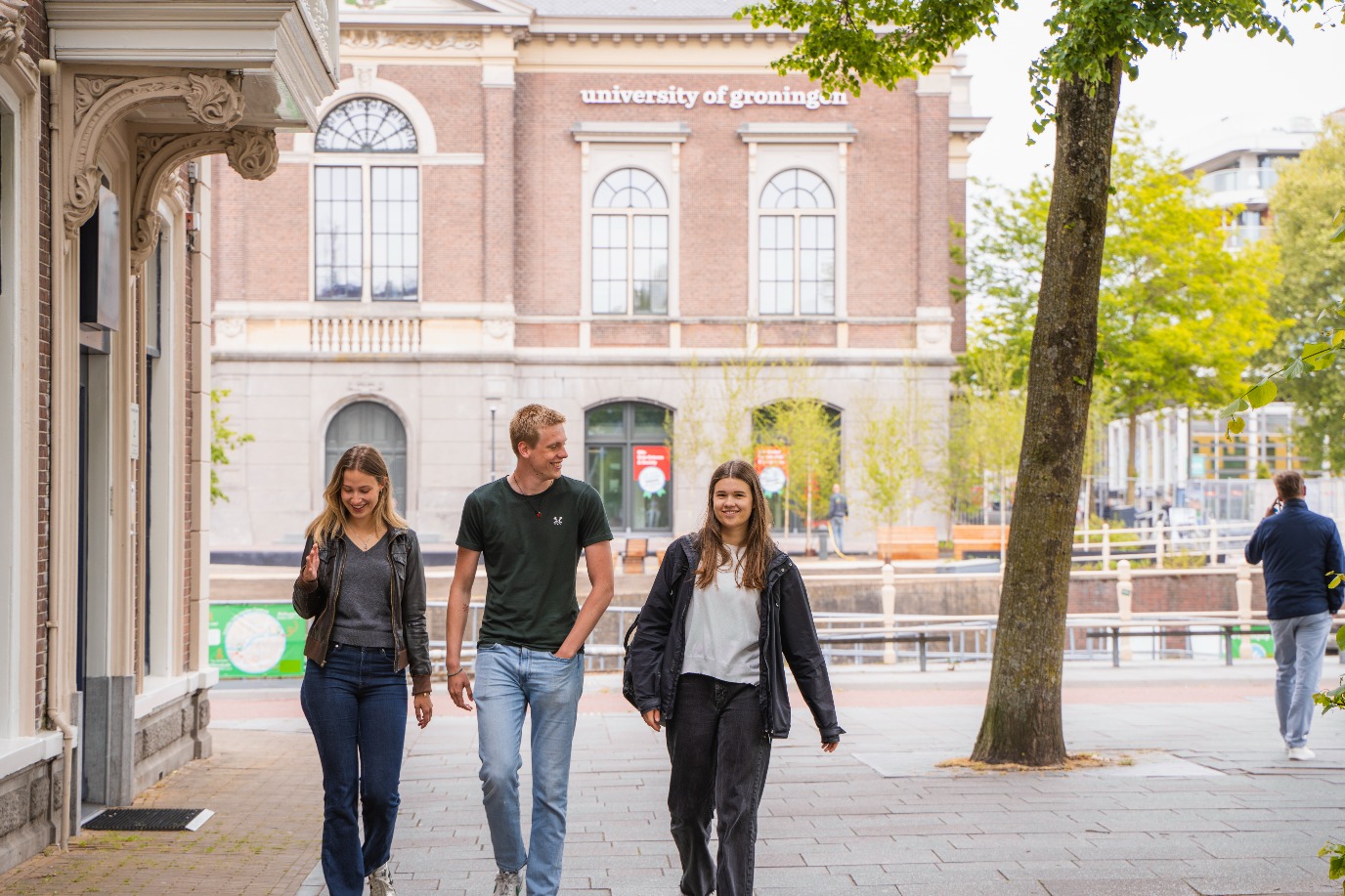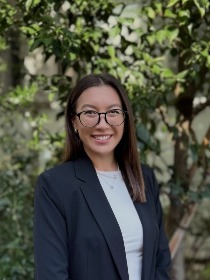Young Leaders in the Making: Sakura's Commitment to Sustainability, Self-Discovery, and Contributing to a Better World

What drives a young leader to dedicate her career to global sustainability? In this interview, Sakura, a German-Japanese graduate of the Global Responsibility & Leadership (GRL) programme at Campus Fryslân, reflects on how her studies, international experiences, and internships shaped her path toward the United Nations University and a future in sustainable development.
To begin, could you share a bit about your background?
Hello, my name is Sakura, and I am German-Japanese. After participating in several Sustainable Development Goals (SDG)-related youth programs such as the Model International Criminal Court (MICC), Junior Chamber International (JCI), and other initiatives focused on climate action, I discovered my passion for contributing to a better world. These experiences made me realize that I wanted to pursue an academic and professional path dedicated to sustainability and global responsibility.
That’s why the Global Responsibility & Leadership (GRL) program was the perfect fit for me. Its interdisciplinary approach, combining various disciplines, allowed me to explore complex global challenges from multiple perspectives. I was also drawn to the program’s small-scale, international setting, where I could engage closely with students and teachers from around the world, exchanging cultural insights and perspectives on current issues.
I majored in Responsible Governance* and minored in Ethnography and Global Health.* Throughout my studies, I became particularly interested in humanities-related themes, especially gender equality, which continues to be one of my main areas of focus.
Looking back, which experiences during your Bachelor’s were most transformative?
Looking back on my three-year bachelor’s journey, the most transformative experience was my exchange semester at the National Autonomous University of Mexico (UNAM) in Mexico City. I took all my courses in Spanish and focused on subjects that offered a distinctly Mexican and Latin American perspective. This experience not only broadened my understanding of global issues, helping me move beyond the primarily European and Asian viewpoints I had previously been exposed to, but also improved my Spanish skills tremendously.
Outside the classroom, I built wonderful, long-lasting friendships with both Mexican and other international students, connections I continue to cherish deeply. My time in Mexico not only enriched me academically and personally but also inspired my bachelor’s thesis topic. I decided to focus on a serious issue I became aware of during my stay: femicide and violence against Indigenous women in Mexico.
This semester profoundly shaped my understanding of Mexico, its current challenges, its rich culture, and its remarkable people. It remains one of the most meaningful chapters of my academic journey.
How did your GRL experiences prepare you for your current focus on sustainability at the university?
The interdisciplinary focus of the GRL program prepared me exceptionally well for my current studies in sustainability. It encouraged me to approach global challenges from multiple perspectives: political, social, and environmental, which aligns perfectly with the holistic nature of sustainability. Through courses in governance, ethnography, and global health, I learned to connect policy frameworks with cultural contexts and community realities.
The program also emphasised collaboration and problem-solving in small, international groups, which strengthened my ability to work effectively with people from diverse backgrounds, an essential skill in both sustainability initiatives and international organisations. Altogether, these experiences equipped me with the mindset and analytical tools to understand sustainability not as a single discipline, but as an interconnected system. This interdisciplinary perspective continues to shape my academic interests and professional direction today.
❝The interdisciplinary focus of the GRL program prepared me exceptionally well for my current studies in sustainability. [...] Through courses in governance, ethnography, and global health, I learned to connect policy frameworks with cultural contexts and community realities.❞
What was your journey like after graduating from GRL?
After graduating from GRL, I knew I wanted to gain practical experience before starting my master’s degree, although I wasn’t yet sure where or what I wanted to study. I began exploring internships with NGOs and sustainable consulting firms. I applied for several humanitarian-focused NGO positions but was not selected, and my interviews with business-oriented companies made me realise that the corporate route wasn’t the right fit for me.
A few weeks into the summer break, I came across an internship opportunity with the Global Crop Diversity Trust (Crop Trust), an international NGO based in Bonn next to several UN organisations. Initially, I wasn’t sure if working on crops and seeds aligned with my strengths, since my academic focus had mainly been on gender-related issues. However, thanks to my background knowledge in agriculture from courses such as Environmental Governance and Earth Systems, I decided to take the opportunity… and I’m very glad I did.
As part of the External Affairs team, I supported both the Communications and Resource Mobilisation units. My tasks included assisting with events linked to major international platforms such as COP29, CBD COP16, and the World Economic Forum in Davos. I also contributed to news articles about agricultural projects, the Global Seed Vault in Norway, and even joined a business trip to Tokyo to meet with ministers for donor collaboration. It was an incredible and eye-opening experience that deepened my understanding of how biodiversity, food systems, and global policy intersect.
Could you tell us about your Master’s studies at the UN University?
During my internship, my interests evolved, and I realized I wanted to focus more on climate change and its impacts on agriculture, topics I had explored during my time at the Crop Trust. This motivated me to apply to the United Nations University – Institute for the Advanced Study of Sustainability (UNU-IAS) in Tokyo. The application process was competitive and challenging, so I was thrilled when I was selected.
Although my focus has shifted toward sustainability, I remain deeply committed to gender equality. For my master’s thesis, I am now exploring the role of female farmers in sustainable agriculture and food security. This allows me to combine the insights I gained during GRL with the practical experience from my internship, integrating both humanitarian and environmental perspectives.
I am currently part of a cohort of 11 master’s students from around the world. Learning from their diverse research interests, as well as from lecturers who are UN experts and ministers teaching on specific SDG topics, has been incredibly motivating. It continues to inspire me to approach sustainability with a holistic and interdisciplinary perspective.
How did your time at Campus Fryslân contribute to your personal and professional growth?
My time at Campus Fryslân was a period of significant personal and professional growth. It helped me become more independent, discover my strengths and preferences, and learn how to balance different aspects of life. Although the bachelor’s program was full-time, it taught me how to manage both academic and personal commitments effectively. I learned to dedicate myself to my studies while also holding side roles, such as working as a student assistant, teaching assistant, and at BCL Leeuwarden, pursuing hobbies like sports and playing the cello, and, most importantly, spending quality time with friends.
In my view, this experience was a crucial first step toward adulthood, showing me that it is possible to grow academically while still enjoying life, and to manage both in a sustainable way. Since then, I have gravitated toward international communities, which I enjoy most. This background helps me greatly today when interacting with diverse groups, including local Japanese residents, international professors, and fellow students. At the same time, it strengthened my pride in my own cultural identity, allowing me to confidently engage with others while staying true to myself.
❝This experience was a crucial first step toward adulthood, showing me that it is possible to grow academically while still enjoying life, and to manage both in a sustainable way.❞
Since leaving university, what’s one key lesson or realization that has stayed with you?
Since leaving university, one key realization that has stayed with me is the importance of embracing flexibility and being open to unexpected opportunities. During my internship at the Global Crop Diversity Trust, I initially doubted whether working on crops and seeds aligned with my academic strengths. However, by stepping out of my comfort zone and seizing the opportunity, I discovered new interests in sustainability, climate change, and global food systems. This experience taught me that growth often comes from trying things you weren’t expecting, and being adaptable can lead to both professional development and personal fulfillment.
Finally, what would you say to a prospective student torn between GRL and another programme?
I would tell a prospective student that GRL offers a uniquely interdisciplinary and intimate learning environment that is hard to find in larger programs, like for instance International Relations. While International Relations focuses primarily on politics and diplomacy, GRL allows students to explore global challenges from multiple perspectives: political, social, environmental, and cultural within a small, international cohort. This interdisciplinary approach is especially valuable for anyone interested in sustainability, policy, or working with international organisations like the UN, because real-world global issues rarely fit neatly into one discipline. I’m still learning that you can’t tackle an SDG with policy alone; interdisciplinary thinking really is the key!
Another major advantage of GRL is its breadth. By studying a wide range of disciplines, students have many options afterwards. Personally, it allowed me to combine what I learned in my internship with GRL, even though, objectively, they don’t have much in common (!) and create a unique pathway that integrates both my environmental and humanitarian interests.
GRL also fosters a strong sense of community. As part of the University College, first-year students live and study closely with their peers, creating a supportive environment where you always have someone to talk to and never feel alone. Beyond their cohort, GRL students interact with others across the broader campus, enriching learning with diverse perspectives and fostering lasting connections. Combined with active engagement, collaboration, and critical thinking, GRL provides a holistic pathway for students who want to make a tangible global impact while benefiting from close support and a vibrant, international community.
❝This interdisciplinary approach is especially valuable for anyone interested in sustainability, policy, or working with international organisations like the UN, because real-world global issues rarely fit neatly into one discipline.❞
Looking ahead, what are your aspirations for the future?
Looking ahead, I hope to work in NGOs or UN-related organisations that focus on sustainable agriculture, particularly supporting smallholder farmers. I would love to continue researching and engaging directly with these farmers, learning from them how to ensure food security in a world where climate change is increasingly affecting their lives. The FAO, for example, would be an incredible place to contribute and grow.
At the same time, I’ve learned over the past few years that anything can happen, and my path may take unexpected turns. I’m open to exploring many opportunities, so you could ask me again in two years where my journey has led.
My advice to students is that it’s okay not to define your career at the very beginning of your academic journey, what matters most is staying curious, learning actively, and being open to the possibilities that come your way.
*These were the former programme majors.

Curious to learn more about the programme?
-
Visit our BSc Global Responsibility & Leadership webpage;
About the author

Sakura Radscheit is a graduate of the BSc in Global Responsibility & Leadership offered at Campus Fryslân, University of Groningen.

